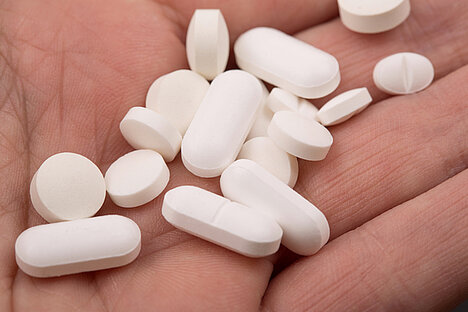Platelet aggregation inhibitors

Antiplatelet agents are drugs that prevent or reduce the formation of blood clots. They are often used in people with cardiovascular disease to reduce the risk of heart attack or stroke. But did you know that dogs can also benefit from antiplatelet drugs?
Why do dogs need antiplatelet drugs?
Dogs can be prone to blood clots for various reasons. For example, they may have a genetic predisposition that affects their blood clotting. Or they may suffer from conditions that make the blood thicker or stickier, such as diabetes, kidney disease or cancer. Certain operations or injuries can also increase the risk of blood clots.
Blood clots can be very dangerous for dogs as they can block blood flow to vital organs such as the brain, heart or lungs. This can lead to serious complications such as paralysis, heart failure or respiratory distress. In some cases, blood clots can even be fatal.
Antiplatelet agents work by inhibiting the function of platelets (thrombocytes), which play an important role in blood clotting. By preventing or reducing platelet aggregation (the sticking together of blood platelets), they help to prevent or dissolve the formation of blood clots.
What antiplatelet drugs are available for dogs?
There are different types of antiplatelet agents that are suitable for dogs. The most common are:
- Aspirin: This is a non-steroidal anti-inflammatory drug (NSAID) that has both anti-inflammatory and blood-thinning properties. It is often used in dogs with heart disease to reduce the risk of thrombosis. The usual dose for dogs is between 5 and 10 mg per kilogram of body weight per day, but it can vary depending on the dog's condition. Aspirin should always be given with food to avoid stomach problems.
- Clopidogrel: This is a drug that specifically inhibits the binding of platelets to each other. It is often used in combination with aspirin in dogs with heart disease or other conditions that increase the risk of blood clots. The usual dose for dogs is between 0.5 and 1 mg per kilogram of body weight per day.
- Heparin: This is a natural anticoagulant (blood thinner) that inhibits the activity of clotting factors in the blood. It is often used in dogs with acute or severe blood clots to dissolve or prevent them. It is usually administered as an injection under the skin or into a vein. The dose depends on the dog's weight and condition and needs to be monitored regularly.
What are the pros and cons of antiplatelet drugs in dogs?
Antiplatelet drugs can be very useful for dogs at high risk of blood clots, as they can prevent serious consequences such as organ damage or death. They can also improve the quality of life and life expectancy of dogs with chronic diseases.
However, antiplatelet drugs also have some disadvantages and side effects that need to be considered. For example, they can increase the risk of bleeding as they interfere with normal blood clotting. This can lead to problems such as nosebleeds, bleeding gums, stomach ulcers or internal bleeding. They can also interact with other medications or supplements that also affect blood clotting. Therefore, it is important to always consult your veterinarian before giving antiplatelet drugs to a dog.
How can dogs be helped with antiplatelet drugs?
If your dog needs to take antiplatelet medication, there are a few things you can do to help him:
- Follow the vet's instructions carefully and give him the right dose at the right time. Do not change the dose without consulting the vet.
- Watch your dog for signs of bleeding or other side effects and report them to the vet immediately. These include weakness, lethargy, pale gums, blood in the urine or feces, vomiting or diarrhea.
- Avoid giving your dog other medications or supplements that can affect blood clotting, such as ibuprofen, naproxen, vitamin E or garlic. Always ask your vet for advice before trying anything new.
- Keep your dog away from sharp or pointed objects that could injure him. Trim his claws regularly and keep his environment clean and safe.
- Support your dog with a healthy diet and sufficient exercise to strengthen his cardiovascular system and control his weight.
Antiplatelet drugs can be life-saving for dogs at high risk of blood clots. By taking good care of your dog and working closely with the vet, you can help them live a long and happy life.
The authors assume that a veterinarian should be consulted if an animal is ill and that medication should only be taken after consultation with a doctor or pharmacist. Only an individual examination can lead to a diagnosis and treatment decision.
We help you find the nearest vet → This way